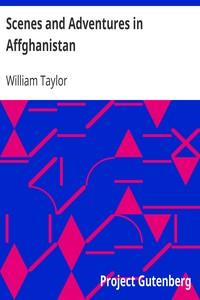|
|
Read this ebook for free! No credit card needed, absolutely nothing to pay.Words: 10658 in 4 pages
This is an ebook sharing website. You can read the uploaded ebooks for free here. No credit cards needed, nothing to pay. If you want to own a digital copy of the ebook, or want to read offline with your favorite ebook-reader, then you can choose to buy and download the ebook.

: Scenes and Adventures in Affghanistan by Taylor William - Afghan Wars; Afghanistan Description and travel@FreeBooksWed 07 Jun, 2023 hah Soojah, and that there would consequently be more work for the British troops. Regret and envy of our more fortunate comrades were therefore the predominant feelings which pervaded nearly the whole of the departing troops. We left Cabul on the 14th of September, and arrived at Ghuznee, the scene of our former exploits, after eight days' march, during which nothing worthy of mention occurred. It is astonishing how soon the traces of war disappear, and the living gaps caused by its ravages are filled up. The fortress appeared as perfect in its outline as if the hand of the destroyer had not recently passed over it, new gates having been substituted for those which had been damaged, and the breach immediately above them re-filled with masonry. The inhabitants of the bazaar had resumed their accustomed occupations, and scolded, and chaffered, and jested, and laughed, as if they had neither lost relatives nor friends, nor dabbled through mire freshly reeking with their blood. Familiarity, they say, breeds contempt and blunts the feelings, and the Asiatic, before whose eyes such scenes pass almost daily, thinks of them only as the immutable decrees of fate, which cannot be shunned, and ought not to be repined at. The sick and wounded, of whom we had left numbers at Ghuznee, had almost all died, and were interred in an open space selected for the purpose outside the walls of the fortress. The last resting-place of our brave fellows is situated at the foot of one of the adjacent mountains, but neither stone nor inscription indicates the spot. The Bengal regiment of Native Infantry, whom we found in garrison at Ghuznee on our return, and whom we left after us, appeared to be quite as well reconciled to their quarters as we were at Cabul, although the two places appeared to me vastly different in point of health and comfort. The majority of the inhabitants regarded the troops with a sort of sullen indifference, but the trading classes seemed civil enough. The quantities of fish and game with which the neighbourhood abounded, afforded the officers a ready means of dissipating their time, and we would have been well content to have remained here. Orders were however given that we should pursue our route, and we left Ghuznee on the 25th of September, after a stay of only two or three days. Instead of diverging to the right towards Candahar, we took the direct route to Quettah, over the Ghiljie hills. The weather had become intensely cold, and the rivers and streams were covered with ice, several inches in thickness. The Rev. Mr. Pigot, our chaplain, happened to be crossing one of them on a pony, when the ice gave way with his weight, and the worthy clergyman was immersed in the water. The stream was not, however, so deep as to occasion any alarm for his safety, and he was speedily rescued from his embarrasment, with no other inconvenience than being kept shivering several hours in his wet clothes, his baggage being at a considerable distance in advance. The rascally native who preceded us as guide grinned maliciously, and told him that if he had not forgotten to say his prayers setting out the accident would not have happened. On encamping, at the close of the first day's march, from Ghuznee, some soldiers belonging to the 17th Infantry and Queen's Royals, went out in search of water, and met with a draw well, which proved to be dry. One of them descended in order to examine it more closely, and an exclamation of horror escaped him as he reached the bottom. On his companions enquiring the occasion of it, they learned that he had fallen upon several skeletons, the identity of which with some soldiers we had lost on the route upwards was placed beyond doubt by fragments of military clothing and regimental buttons which lay scattered about. Singular to relate, a lark had built its nest in one of the skulls, and was found innocently reposing with its young in this curious receptacle. The annoyances to which we had been subjected during our route upwards, from the thieving system of warfare pursued by the Affghans, seemed now at an end. Our road lay through bleak and desolate hills, where only a solitary, and timid mountaineer was occasionally to be seen. Numerous rivers and streams traversed this wild country in every direction, and relieved us from all apprehensions on the score of water. Provisions were also plentiful, as the Commissariat had taken care to lay in sufficient supplies, and the only inconvenience which we might be said to have experienced was the severe cold of the nights. The barren nature of the country rendered fuel difficult of obtainment, and the consequence was that numbers of the troops were carried off by dysentery. The march from Ghuznee to Quettah occupied about five weeks, and we thought we should never reach the end of these long chains of hills. Always ascending and descending heights of no inconsiderable elevation, the horses became regularly knocked up with fatigue, and we were obliged to shoot numbers of them on the way. In a recess in one of these hills, I one day came upon a singular scene. About nine or ten of the natives were assembled around a dead horse and while part of them were cutting steaks from his haunches, the others were engaged cooking them. Revolting as such a sight is to European stomachs, I have seen the time when, on our march upwards, I could have partaken of these same horse steaks with infinite relish. A few days before our arrival at Quettah, we requited an atrocious act of treachery, which had been committed towards us by some Ghiljie chiefs, with the punishment it richly merited. About one hundred camel drivers, who had left us at Candahar, on our way to Cabul, for the purpose of returning homewards, took their route over the hills we were now crossing in order to shorten the journey. They were met by the Ghiljies with professions of friendship, and seduced into a mountain fort under the pretence of hospitality. They had no sooner entered its walls than their throats were all cut, and their bodies flung into deep wells for the purpose of concealing the massacre from the eyes of the British. Information of the fact having been received, Sir Thomas Wiltshire despatched a Squadron of her Majesty's 4th Light Dragoons, two companies of Native Infantry, and two pieces of artillery to raze the fortress to the ground. The cavalry started at two o'clock in the morning, and after a hard gallop of eighteen miles we arrived in front of the Ghiljie strong-hold. It was a small but strongly constructed fortress, situated on the brow of a steep declivity and defended by strong wooden gates. The entrance was commanded by an old iron carronade, and a number of loopholes for the discharge of musketry. Not a living soul was to be seen on the walls, and fearing some artifice, Major Daly, our commanding officer, resolved to suspend operations until the artillery came up. As soon as the latter made its appearance, and the guns were placed in a position to command the fort, Major Daly ordered part of the cavalry to dismount and proceed with loaded carbines to the gate, under cover of their fire. No opposition was, however, offered to us, the enemy having fled to the mountains, and the gates were forced open in a few minutes. The only inhabitants we found in the place were a few women and children, but we discovered quantities of the richest silks and carpets, beside arms and money the fortress being a sort of depot for the booty obtained by these highland marauders. Free books android app tbrJar TBR JAR Read Free books online gutenberg More posts by @FreeBooks
: Encyclopaedia Britannica 11th Edition Volume 5 Appendix: Author List by Various - Encyclopedias and dictionaries@FreeBooksWed 07 Jun, 2023

: The Auto Boys' Vacation by Braden James A James Andrew Furman E A Illustrator - Vacations Juvenile fiction; Automobiles Juvenile fiction; Young men Juvenile fiction@FreeBooksWed 07 Jun, 2023
|
Terms of Use Stock Market News! © gutenberg.org.in2025 All Rights reserved.






